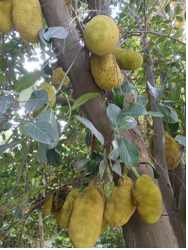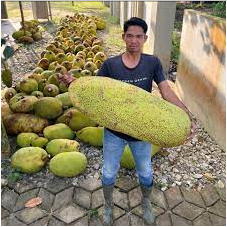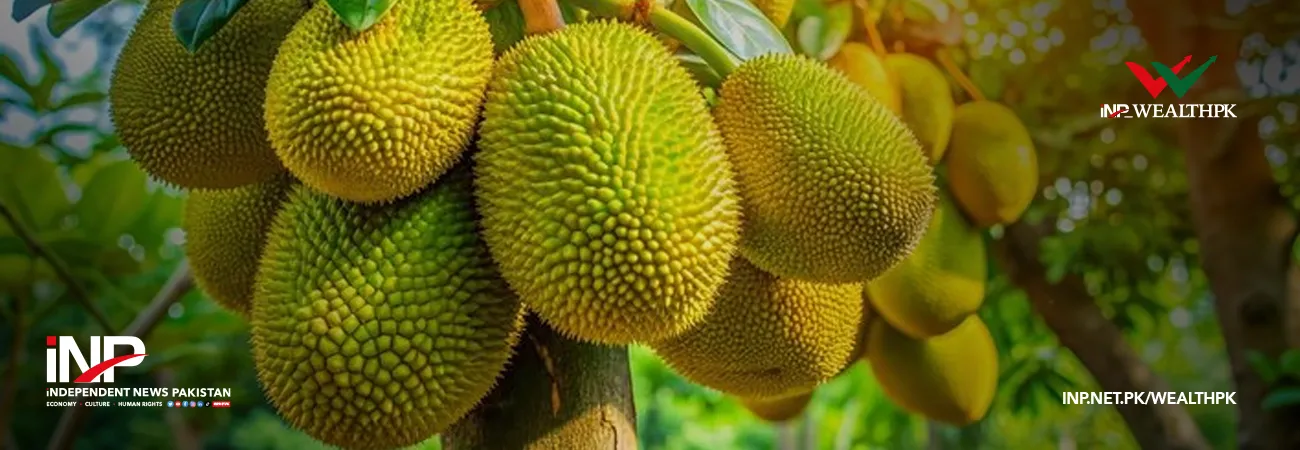INP-WealthPk
Azeem Ahmed Khan
Drawn by the promise of high profits and jackfruit's resilience to extreme weather, a growing number of forward-thinking farmers in Pakistan are turning to this tropical delicacy, which is steadily carving out its place in the nation's fruit industry.

Jackfruit is grown in tropical and subtropical regions across the globe, particularly in areas with a warm and humid climate. It is the national fruit of Bangladesh and Sri Lanka, while other key jackfruit-producing countries include India, Thailand, Indonesia, Malaysia, Vietnam, the Philippines, Myanmar, Kenya, Uganda, Tanzania, Nigeria, Madagascar, Brazil, Jamaica, Fiji, and Papua New Guinea.
Jackfruit, known locally as “Kathal,” is not yet grown on a large commercial scale in Pakistan, but it is being successfully cultivated privately and on a trial basis in the country’s warmer regions.
Hafiz Abdul Raof Rehan, a farmer from Channi Taja Rehan village in Sargodha district, highlighted the immense potential of jackfruit cultivation while speaking to WealthPK about his orchard.
“We have one 15-year-old tree, three 10-year-old ones, and one that is seven years old. Currently, four of them are bearing fruit,” he said. Jackfruit starts fruiting after about seven years, and the yield increases as the tree ages, he added.
“When it gives good quantity of fruit, one can earn at least Rs200,000 from a single tree,” Rehan said. “It is such a rewarding crop that one fruit alone can weigh up to 25 kilogrammes, and the best part is that no matter how strong the storm, the fruit never falls off the tree.”
He further explained that jackfruit is the biggest fruit that grows on any tree in the world. “Interestingly, the fruit does not hang from the branches, it grows directly on the trunk and main stems.”
Jackfruit has a spiky, thick, and tough outer skin, usually coloured greenish-yellow to greenish-brown and its fruiting season runs from June to August, he added.
For Rehan, the journey began with the guidance and encouragement of Mian Saeed, a seasoned farmer and advocate of rare fruit cultivation, who started growing jackfruit in Pakistan some 25 years ago.
He said that he acquired the jackfruit plants from Saeed, and that the trees have flourished in the local climate. “I use only organic fertilisers, cow manure and leaf compost, and water the trees only when needed because overwatering causes rotting,” he said. It also needs fewer pesticides contrary to many other crops, he added.
The height of the jackfruit tree is similar to a mango tree, tall and large in size, Rehan said. “It is a perfect tree for the climate in Punjab, Sindh, and Balochistan, though it does not thrive in colder climates in the northern areas of the country.”
Rehan said that he now sells nursery plants as well. “One plant of about 1.5 feet is sold for Rs600.” He also shared practical details for those interested in commercial cultivation. “You can grow 100 jackfruit trees in one acre, keeping a distance of 20 feet between them,” he advised.
Rehan sells jackfruit both online and on-site, fetching up to Rs500 per kilogramme. “If someone grows jackfruit on an acre of land, they can earn millions, it is so profitable,” he stated confidently, encouraging others to visit the orchard and see the results for themselves.
He stressed that Pakistan’s environment is well-suited for growing jackfruit and it is easy to cultivate here. “I have provided plants to many farmers, and they are seeing returns within a few years.”

The increasing popularity of jackfruit is not only due to its exotic taste and weighty yield but also due to its health and commercial benefits.
Abrar Hussain, Chief Executive Officer of Abdul Jabbar Nursery Farm, Pattoki, in Kasur district, shed light on the historical and medicinal significance of the fruit.
“This jackfruit tree is native to our region and was once widely cultivated, and highly prized during the Mughal era. In fact, the Mughals used to store its fruit and use its wood in warfare,” he told WealthPK. “It is one of the strongest woods in the world, even gun butts in the British-era were made from jackfruit wood due to its strength and light weight,” Abrar explained.
He also elaborated on its health benefits, saying, “It is an energy powerhouse because it is rich in vitamins A and C, magnesium, potassium, calcium, copper, iron, and fibres. Doctors recommend it for patients suffering from liver problems, stomach issues, cancer, diabetes, blood pressure, and weak bones.”
According to Abrar, the plant begins flowering in its eighth year in Sindh and 12th year in Punjab and can yield 50 to 250 fruits per tree per year, with heights reaching up to 80 feet in ideal conditions.
After the plant is established, it does not need much care, so it is ideal for farmers with large landholdings. “It can be planted on boundaries and forgotten, it will still reward you,” he suggested.
Jackfruit cultivation is highly profitable, with the fruit selling for up to Rs500 per kilogramme, Abrar said. It serves multiple purposes, used as a fruit, meat substitute, and a vegetable, while its seeds are commonly consumed as a dry fruit, he added.
Credit: INP-WealthPk









